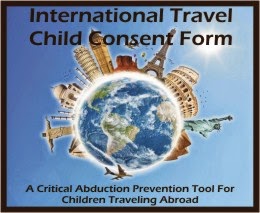Peter Thomas Senese and the I CARE Foundation’s groundbreaking International Travel Child Consent Form has been hailed by the international legal community as a critically important child abduction prevention tool that all parents around the world should use when allowing a child to travel abroad.
It is estimated that approximately 70% of all cases of international parental child abduction occur when a child is wrongfully detained in a foreign country. The wrongful detention of a child abroad generally occurs during a court directed travel order or when travel occurs by mutual parental consent, particularly during the summer school break or the Christmas holiday season. However, unknown to the targeted parent who may either travel with the child or who may remain in the child’s country of habitual residency, the scheming parent intending to remain abroad with the child has more than likely crafted a well-orchestrated scheme that includes use of Article 12 and Article 13 of the Hague Convention in order to remain abroad with the child. Unfortunately, the vast majority of children wrongfully detained in a foreign country do not come home. The I CARE Foundation’s ‘International Travel Child Consent Form’ protects against misuse of all known international child abduction defenses under the 1980 Hague Child Abduction Convention, including Articles 12, 13, and 20, while upholding the intent and spirit of Article 1 of the Child Abduction Convention.
It is important to ask why the majority of parents are successful in carrying out their scheme of abduction?
Peter Thomas Senese, the creator of the I CARE Foundation’sInternational Travel Child Consent Form and the Executive Director of the I CARE Foundation stated, “Perhaps the singular most important factor is that local courts in foreign countries are not abiding by the intent and spirit of the Hague Child Abduction Convention. Specifically, all abductors will make defense claims under Article 12 or Article 13 of the Hague Convention. Article 12 has to do with intent to relocate, and Article 13 has to do with the ‘Best interest of the child’, which recently has been expanded in many courts to include ‘Best interest of the child and extended family’. Unfortunately, Article 13 in particular has become the Achilles Heel of the abduction prevention community.
“Hague Conference During Hague proceedings, the convention calls for the inbound country’s Hague Court to look at Article 13 defenses only in extreme cases as the intent of the 1980 Hague Child Abduction Convention is to determine which court has jurisdiction of the child, and then properly and expeditiously return that child to the country where the court of original jurisdiction is located. However, around the world, courts are no longer acting in an expeditious manner as is cited under Article 1 of The Hague Child Abduction Convention. Instead, local courts are calling for detailed findings of what is in the best interest of the child and in essence making their own custody ruling even though they are not the court of original jurisdiction. Problematically, these courts are in essence mooting not only the 1980 Hague Child Abduction Convention but they are essentially quashing the court orders originating from the child’s country of original jurisdiction.
“What the I CARE Foundation’s ‘International Travel Child Consent Form’ does is it upholds the intent and spirit of the 1980 Hague Child Abduction Convention, including Article 1’s ‘Expeditious determination clause’. In addition, the travel consent form strongly addresses misuse of Article 12 and Article 13 defenses, and essentially moots use of false claim. In addition, the I CARE Foundation’s travel consent form upholds the sanctity of the court of original jurisdiction located in the child’s country of habitual residency.
In essence, the I CARE Foundation’s ‘International Travel Child Consent Form’ is the only global child abduction prevention tool that safeguards against misuse of the Hague Child Abduction Convention defenses and calls for the immediate return of a child if that child is wrongfully detained by mutual consent of both parents.
Turkey’s Honorable Judge Selma Nilhan Tekinalp, a world renown child advocate and leading authority on Hague abduction law stated, “From the I CARE Foundation sponsored conference at the United Nations I participated in, and discussed with Mr. Peter Thomas Senese numerous issues revolving around how we may prevent abduction, I am pleased to share that the ‘I CARE Foundation’s International Travel Child Consent Form’ has the worldwide potential to dramatically reduce global child abduction. This agreement is deep in Hague law, and strikes at the core of abductor statements who may attempt to mislead courts into sanctioning a kidnapping established under the rules of the Hague Convention.”
Armin U. Kuder, partner at the highly respected firm Kuder, Smollar & Friedman, has been named in every article identifying leading family lawyers in the prestigious ‘Washingtonian Magazine’ added, “The I Care Foundation International Travel Child Consent Form is a powerful tool for exposing a would-be abductor’s intent. If a parent will not sign the form, we have compelling evidence to present to a court in support of limitations on travel, use of passports, and conditions for access to the child.”
For more information please visit The I CARE Foundation at www.theicarefoundation.org. For attorneys seeking access to the legal brief and analysis of the travel consent form please contact legal@theicarefoundation.org

